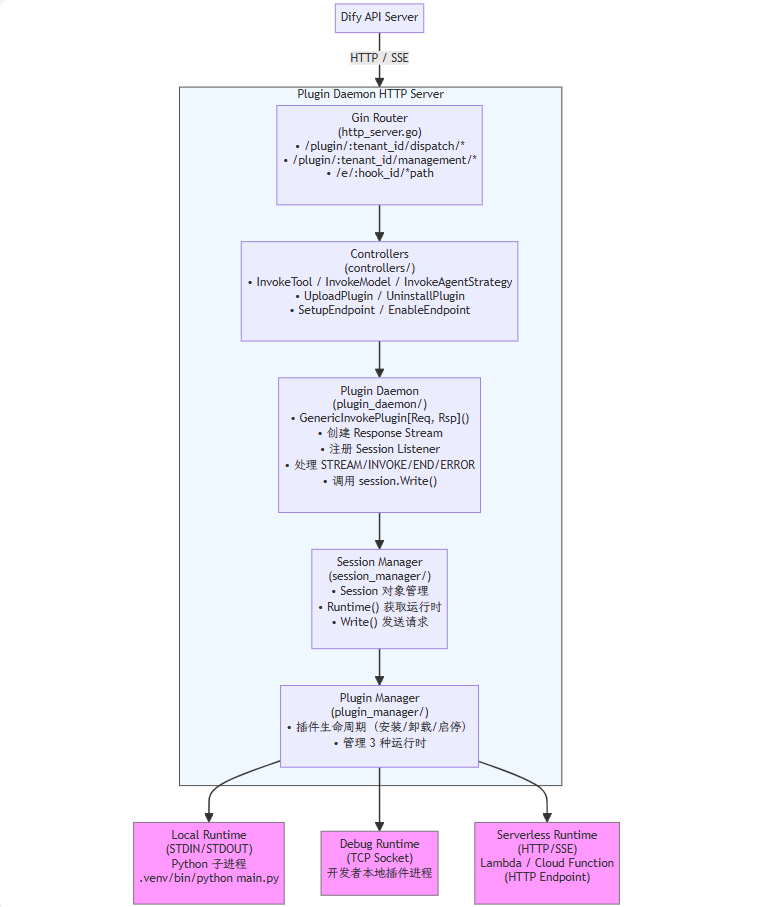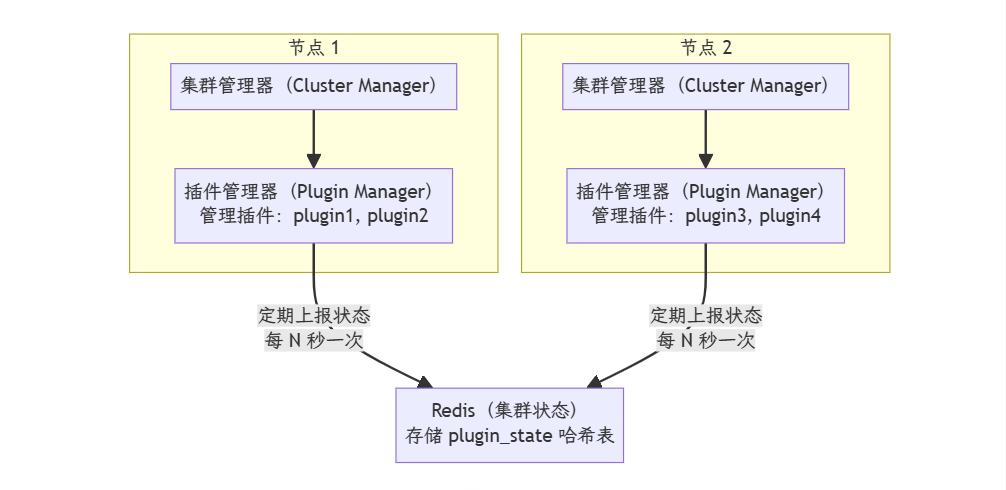Dify Plugin Daemon 旨在管理 Dify 生态系统中插件的完整生命周期。它作为 Dify API 服务器与各种插件运行时环境之间的中央协调器,支持在不同部署场景中无缝执行插件。
Runtime 类型
Local Runtime (本地运行时)
通信方式:STDIN/STDOUT/STDERR
Debug Runtime (调试运行时)
通信方式:TCP Socket
Serverless Runtime (无服务器运行时)
通信方式:HTTP/SSE
类继承关系与接口
PluginRuntime 接口
1
2
3
4
5
6
| plugin_entities.PluginRuntime (接口)
├── Listen(sessionId) *Broadcast[SessionMessage]
├── Write(sessionId, action, data)
├── Type() PluginRuntimeType
├── Configuration() *PluginDeclaration
└── RuntimeState() PluginRuntimeState
|
实现类
LocalPluginRuntime
1
2
3
4
| ├── LocalPluginRuntime (local_runtime/run.go)
│ ├── stdioHolder (stdio.go) - 管理 STDIN/STDOUT/STDERR
│ ├── pythonInterpreterPath - Python 解释器路径
│ └── process *exec.Cmd - 子进程对象
|
RemotePluginRuntime
1
2
3
4
| ├── RemotePluginRuntime (debugging_runtime/run.go)
│ ├── tcpListener net.Listener - TCP 监听器
│ ├── tcpConn net.Conn - TCP 连接
│ └── debuggingKey string - 调试密钥
|
ServerlessPluginRuntime
1
2
3
4
| └── ServerlessPluginRuntime (serverless_runtime/run.go)
│ ├── LambdaURL string - Lambda 函数 URL
│ ├── client *http.Client - HTTP 客户端
│ ├── listeners sync.Map - 会话监听器映射表
|
调用流程
Local Runtime
1
2
3
4
5
6
7
8
9
10
11
12
13
14
15
16
17
18
19
20
21
22
23
24
25
26
27
28
29
30
31
| [Dify API]
↓ HTTP Request
[HTTP Server] (http_server.go)
↓ 路由分发
[Controller] (controllers/)
↓ 调用
[Plugin Daemon] (plugin_daemon/generic.go)
↓ GenericInvokePlugin[Req, Rsp]()
├─→ session.Runtime().Listen(sessionId)
│ └─→ 创建 Broadcast 对象
│ └─→ 注册 stdioHolder 监听器
│
└─→ session.Write(event, action, data)
└─→ stdioHolder.write(data + '\n')
↓ 写入 STDIN
[Plugin Process] (Python 子进程)
↓ 读取 STDIN,处理请求
↓ 写入 STDOUT (JSON 格式,按行)
[stdioHolder.StartStdout()] (stdio.go)
↓ bufio.Scanner 按行读取
↓ ParsePluginUniversalEvent()
├─→ SESSION_MESSAGE_TYPE_STREAM → listener.Send()
├─→ SESSION_MESSAGE_TYPE_INVOKE → backwards_invocation
├─→ SESSION_MESSAGE_TYPE_END → response.Close()
└─→ SESSION_MESSAGE_TYPE_ERROR → response.WriteError()
↓
[Response Stream] (stream.Stream[Rsp])
↓ 流式返回
[Controller] → [HTTP Response] (SSE)
↓
[Dify API]
|
Serverless Runtime
1
2
3
4
5
6
7
8
9
10
11
12
13
14
15
16
17
18
19
20
21
22
23
24
25
26
27
28
29
30
31
32
33
34
35
36
| [Dify API]
↓ HTTP Request
[HTTP Server]
↓ 路由分发
[Controller]
↓ 调用
[Plugin Daemon] (plugin_daemon/generic.go)
↓ GenericInvokePlugin[Req, Rsp]()
├─→ session.Runtime().Listen(sessionId)
│ └─→ 创建 Broadcast 对象
│ └─→ 存储到 listeners.Store(sessionId, broadcast)
│
└─→ session.Write(event, action, data)
└─→ ServerlessPluginRuntime.Write()
↓ routine.Submit() 提交后台任务
↓ 构建 URL: LambdaURL + "/invoke?action=" + action
↓ HTTP POST Request
├─→ Header: Content-Type: application/json
├─→ Header: Accept: text/event-stream
├─→ Header: Dify-Plugin-Session-ID: sessionId
└─→ Body: JSON data
↓
[Lambda Function / Cloud Function]
↓ 处理请求
↓ 返回 SSE 流式响应
[ServerlessPluginRuntime.Write()] (io.go)
↓ bufio.Scanner 按行读取 SSE
↓ ParsePluginUniversalEvent()
├─→ 解析 SessionMessage
└─→ broadcast.Send(sessionMessage)
↓
[Response Stream]
↓ 流式返回
[Controller] → [HTTP Response] (SSE)
↓
[Dify API]
|
Debug Runtime
1
2
3
4
5
6
7
8
9
10
11
12
13
14
15
16
17
18
19
20
21
22
23
24
25
26
27
28
29
30
| [Dify API]
↓ HTTP Request
[HTTP Server]
↓ 路由分发
[Controller]
↓ 调用
[Plugin Daemon]
↓ GenericInvokePlugin[Req, Rsp]()
├─→ session.Runtime().Listen(sessionId)
│ └─→ 创建 Broadcast 对象
│ └─→ 注册 TCP 连接监听器
│
└─→ session.Write(event, action, data)
└─→ RemotePluginRuntime.Write()
↓ 写入 TCP 连接 (JSON + '\n')
↓
[开发者本地插件进程]
↓ 通过 TCP 连接读取请求
↓ 处理请求
↓ 通过 TCP 连接写入响应 (JSON + '\n')
[RemotePluginRuntime.startReading()] (io.go)
↓ bufio.Scanner 按行读取 TCP
↓ ParsePluginUniversalEvent()
└─→ broadcast.Send(sessionMessage)
↓
[Response Stream]
↓ 流式返回
[Controller] → [HTTP Response] (SSE)
↓
[Dify API]
|
核心组件调用关系图

反向调用流程
1
2
3
4
5
6
7
8
9
10
11
12
13
14
15
16
17
18
19
20
21
22
23
| 插件需要回调 Dify API 时:
[Plugin Process]
↓ 发送 SESSION_MESSAGE_TYPE_INVOKE
[Plugin Daemon]
↓ 检测到 INVOKE 消息
[backwards_invocation.InvokeDify()] (backwards_invocation/)
↓ 解析反向调用请求
├─→ 获取 InvokeFrom (Dify API URL)
├─→ 创建 HTTP Request
└─→ 调用 Dify API
↓ HTTP POST to Dify API
[Dify API Server]
↓ 处理请求(查询数据库、调用服务等)
↓ 返回响应
[backwards_invocation]
↓ 接收响应
├─→ Local/Debug: 通过 EventWriter 写回插件
└─→ Serverless: 通过 Transaction Handler 返回
↓
[Plugin Process]
↓ 接收反向调用响应
↓ 继续处理
|
集群模式
集群模式下的插件调度

跨节点调用流程
- Dify API → Node 1 HTTP Server
- Node 1 检查插件是否在本地
- 如果不在,查询 Redis 找到插件所在节点
- 重定向请求到 Node 2
- Node 2 执行插件调用
- 返回响应给 Dify API
1
2
3
4
5
6
7
8
9
10
11
12
|
if ok, originalError := app.cluster.IsPluginOnCurrentNode(identity); !ok {
app.redirectPluginInvokeByPluginIdentifier(ctx, identity, originalError)
ctx.Abort()
} else {
ctx.Next()
}
|
1
2
3
4
5
6
7
8
9
10
|
nodes, err := app.cluster.FetchPluginAvailableNodesById(plugin_unique_identifier.String())
...
nodeId := nodes[0]
statusCode, header, body, err := app.cluster.RedirectRequest(nodeId, ctx.Request)
...
|
关键文件索引
核心接口和实体
pkg/entities/plugin_entities/runtime.go - PluginRuntime 接口定义pkg/entities/plugin_entities/event.go - SessionMessage 消息类型
Local Runtime
internal/core/plugin_manager/local_runtime/run.go - 本地运行时主逻辑internal/core/plugin_manager/local_runtime/io.go - Listen/Write 接口实现internal/core/plugin_manager/local_runtime/stdio.go - STDIN/STDOUT 管理internal/core/plugin_manager/local_runtime/environment_python.go - Python 环境初始化
Debug Runtime
internal/core/plugin_manager/debugging_runtime/run.go - 调试运行时主逻辑internal/core/plugin_manager/debugging_runtime/io.go - TCP 通信实现
Serverless Runtime
internal/core/plugin_manager/serverless_runtime/run.go - 无服务器运行时主逻辑internal/core/plugin_manager/serverless_runtime/io.go - HTTP/SSE 通信实现
插件调用核心
internal/core/plugin_daemon/generic.go - GenericInvokePlugin 泛型调用函数internal/core/plugin_daemon/backwards_invocation/ - 反向调用实现internal/core/session_manager/ - 会话管理
生命周期管理
internal/core/plugin_manager/lifecycle/full_duplex.go - 全双工生命周期internal/core/plugin_manager/manager.go - 插件管理器internal/core/plugin_manager/launcher.go - 插件启动器
集群管理
internal/cluster/cluster.go - 集群管理器internal/cluster/plugin.go - 插件集群调度internal/cluster/node.go - 节点管理
HTTP 服务器
internal/server/http_server.go - HTTP 路由配置internal/server/server.go - 服务器启动internal/server/controllers/ - API 控制器
关键差异对比
| 特性 |
Local Runtime |
Debug Runtime |
Serverless Runtime |
| 通信方式 |
STDIN/STDOUT |
TCP Socket |
HTTP/SSE |
| 进程模型 |
子进程 |
独立进程 |
无状态函数 |
| 启动方式 |
exec.Command() |
TCP 连接 |
HTTP 调用 |
| 环境初始化 |
Python venv |
开发者自行管理 |
预构建镜像 |
| 反向调用 |
全双工支持 |
全双工支持 |
Transaction 机制 |
| 心跳检测 |
120秒超时 |
TCP 连接保活 |
无需心跳 |
| 资源清理 |
Kill 进程 |
关闭 TCP 连接 |
无需清理 |
| 适用场景 |
生产环境 |
开发调试 |
云原生部署 |
| 扩展性 |
单机 |
单机 |
高扩展性 |
| 冷启动 |
首次较慢 |
无冷启动 |
有冷启动 |

